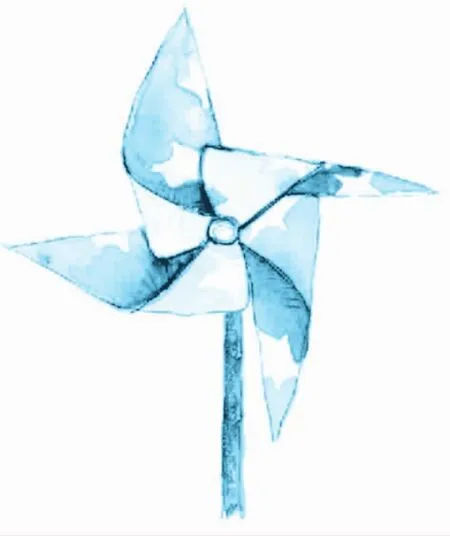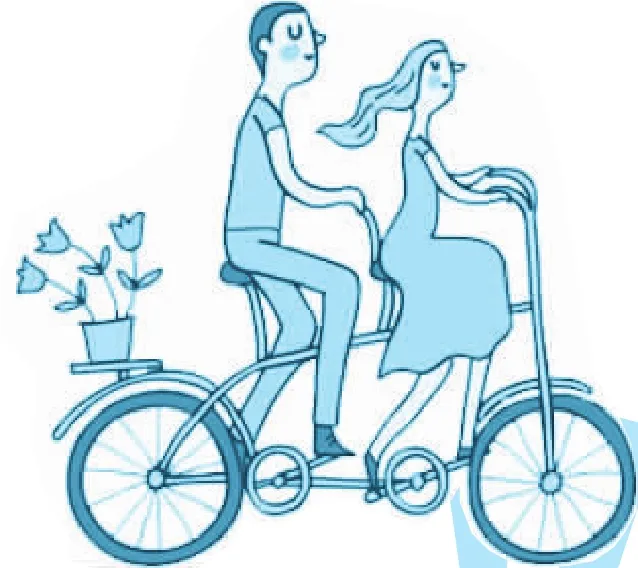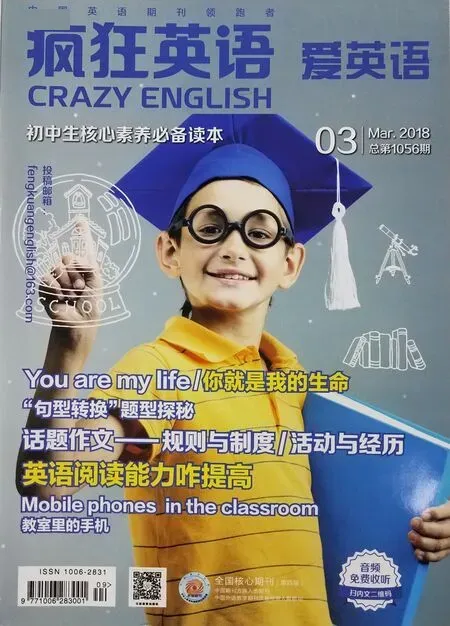重点句型用法点拨
福建 李志艳

●句型梳理
1.It is a pity that only six pieces of music in total by Abing were recorded for the future world to hear,but his popularity continues to this day.
It's a pity that...是一个常见的句型,意为“很遗憾……”。其中that引导的是主语从句,it是形式主语,用来代替后面的主语从句,以使句子平衡。例如:
It's a pity that you missed the important meeting held last Sunday.很遗憾你错过了上周日召开的重要会议。
It's a pity that she has made such a mistake.遗憾的是她犯了这样的一个错误。
【真题链接】
—The concert this evening is sure to be exciting.
—But it is a______that I can't go there with you. 【2015·绵阳中考题】
A.joy B.choice C.pity D.case
【答案与解析】C根据句意“——今晚的音乐会一定令人兴奋。——但是很遗憾我不能和你一起去那儿了。”由具体语境可知,本题考查的是“It is a pity that...”句型,意为“很遗憾……”。故选C项。
2.That's how people in Japan are expected to greet each other.
be expected to do sth.意为“被期望做某事;应该做某事”。表示“应该做某事”时,相当于“be supposed to do sth.”形式。例如:
Mike could not be expected to finish all the work alone.不能期望迈克独自完成所有的工作。
The French are expected to kiss when they meet for the first time.=The French are supposed to kiss when they meet for the first time.法国人第一次见面时应该亲吻。
【真题链接】
—Have you telephoned your husband?
—Yes.He is expected______back next week.【2015·河池中考题】
A.to coming B.to come
C.come D.coming
【答案与解析】B 根据答句的句子结构可知本题考查be expected to do sth.句型,答句的意思是“是的。他下周应该会回来”。故选B项。
3.Neither medicine nor rest can help him.
neither...nor...意为“既不……也不……”,是并列连词短语,表示否定,通常用来连接两个相同的句子成分。当它连接两个主语时,谓语动词要用肯定形式,并且要与其靠近的主语在人称和数上保持一致。例如:
In general,the weather in Britain is neither too cold in winter nor too hot in summer.一般来说,英国冬天的天气不太冷,夏天的天气也不太热。
There is neither ice-cream nor green tea in the fridge.冰箱里既没有冰淇淋也没有绿茶。
Neither his father nor his mother is going with him.他的父亲和母亲都不打算和他一起去。
Neither my wife nor I have been to Brazil.我妻子和我都没有去过巴西。
【特别提醒】
neither...nor...也可以连接两个句子,但这两个句子都要用倒装语序。例如:
Neither did Eric write to me,nor did he call me.埃里克既没给我写信,也没给我打电话。
【知识拓展】
both...and...是neither...nor...的反义短语,意为“……和……(两者)都”,表示肯定的意思。当both...and...作主语时,谓语动词用复数形式。例如:
Both Tom and Lisa are from the United States.汤姆和丽萨都来自美国。
either...or...意为“要么……要么……;不是……就是……”,连接相同的句子成分,表示选择。当连接两个主语时,谓语动词要与后一个主语在人称和数上保持一致。例如:
When Maryishappy,she eithersingsor dances.玛丽高兴时,不是唱歌就是跳舞。
Either you or I am going there tomorrow morning.明天上午要么你去那里,要么我去那里。
【真题链接】
1.I could speak______French______Chinese,but luckily I could talk with him in English.【2016·巴中中考题】
A.both;and B.neither;nor
C.either;or

【答案与解析】B both...and...意为“……和……(两者)都”;neither...nor...意为“既不……也不……”;either...or...意为“要么……要么……”。根据题干中后一个分句的意思“但是幸运的是,我能用英语和他交谈”可知,题干中前一个分句的意思应该是“我既不会说法语,也不会说汉语”。故选B项。
2.Neither Li Hua nor I______good at writing.【2016·永州中考题】
A.am B.is
C.are
【答案与解析】A neither...nor...意为“既不……也不……”,当该短语连接两个主语时,谓语动词要与nor后的主语在人称和数上保持一致。本题中nor后的主语是I,因此be动词用am。故选A项。
3.—When shall we send the washing machine to you,Mrs.Read?
—______on Thursday______on Friday,please.I'll be at home then. 【2016·海南中考题】
A.Either;or B.Neither;nor
C.Both;and
【答案与解析】A either...or...意为“要么……要么……”;neither...nor...意为“既不……也不……”;both...and...意为“……和……(两者)都”。问句的意思是“里德夫人,我们什么时候把洗衣机给您送去?”。答句中后一个句子的意思是“那时我在家”,其中的“那时”指的就是前面提到的Thursday和Friday。由此可见,送洗衣机的时间要么是在星期四,要么是在星期五。
4.Both Peter and Tom______from England and English is their native language.【2016·百色市中考题】
A.am B.is
C.are D.be
【答案与解析】C both...and...意为“……和……(两者)都”,当连接两个主语时,谓语动词用复数形式。
4.I'd rather go to Blue Ocean because I like to listen to quiet music while I'm eating.
would rather意思是“宁愿;宁可”,经常缩写为’d rather形式。would没有人称和数的变化,其后接动词原形。例如:
Mrs.Green would ratherworkin the countryside.格林夫人宁愿在农村工作。
【知识拓展】
would rather与than连用可构成would rather...than....句式,意为“宁愿……而不愿……”,此时would rather和than后面都接动词原形。如果would rather和than后面所接的是同一个动词,那么than后的动词可以省略。would rather...than...也可写成would...rather than...,二者的意思和用法相同。例如:
The children would rather walk than take a bus there.孩子们宁愿步行也不愿乘公共汽车去那里。
They would rather play soccer than(play)volleyball.他们宁愿踢足球,也不愿打排球。
【真题链接】
—Are you going swimming this afternoon?
—I'd rather______with you.【2016·兰州中考题】
A.to go shopping B.go shoping
C.to go shoping D.go shopping
【答案与解析】D 答句中的“I'd rather”是I would rather的缩写形式。would rather意为“宁愿”,后接动词原形,排除A、C两项。shop的动词-ing形式是shopping,排除B项。故选D项。
●跟踪检测
Ⅰ.根据句意,从A、B、C、D四个选项中选择适当的答案。
1.My grandma's hobby is______cooking______watching TV.It's square dancing.
A.not only;but also B.neither;nor
C.both;and D.either;or
2.—I have two apples.Which one do you like?
—I'd rather______the smaller one.
A.had B.to have
C.have D.having
3.—Neither Linda nor Susan______the music club because they have no time.
—What a pity!
A.haven't joined B.hasn't joined
C.have joined D.has joined
4.—How about seeing a movie,Jane?
—Well,I would stay at home rather than______to the movies.
A.go B.going
C.goes D.went
Ⅱ.按要求完成句子,每空一词。
5.Neither the father nor the son is interested in the new movie.(改为肯定句)
______ the father______ the son______interested in the new movie.
6.Paul is expected to run every morning.(对画线部分提问)
______is Paul expected____________every morning?
7.很遗憾他们错过了这次出国的机会。(完成译句)
______ ______ ______ ______ thatthey missed the chance of going abroad.
(答案见64页)

